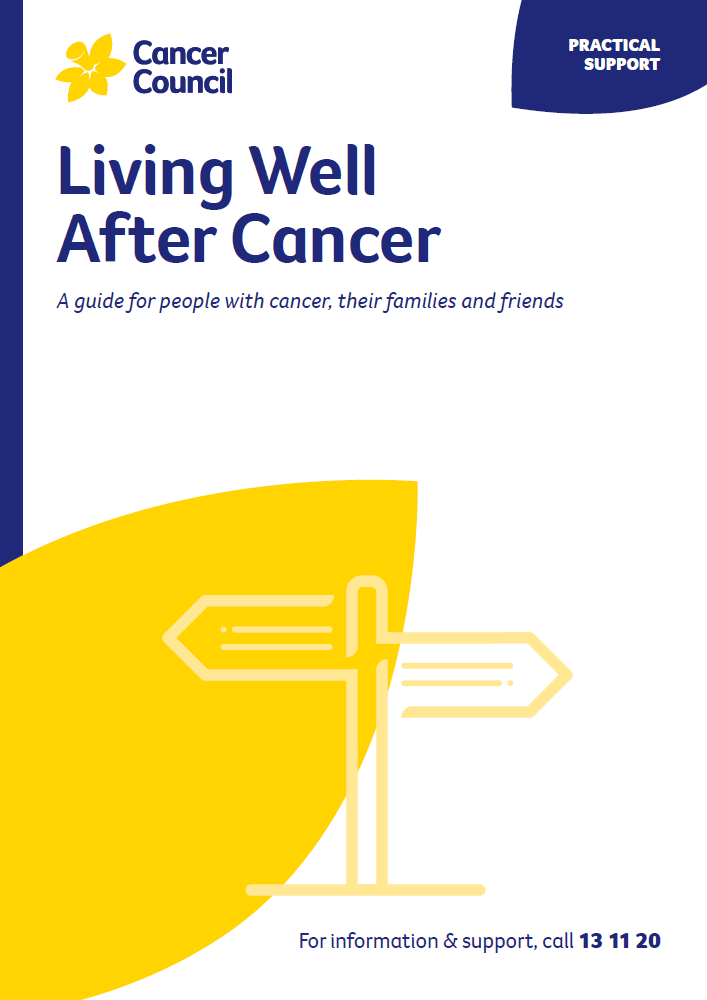- Home
- Hodgkin lymphoma
- Life after treatment
Life after treatment
For most people, the lymphoma experience doesn’t end on the last day of treatment. Life after lymphoma treatment can present its own challenges. You may have mixed feelings when treatment ends, and worry that every ache and pain means the lymphoma is coming back.
Some people say that they feel pressure to return to “normal life”. It is important to allow yourself time to adjust to the physical and emotional changes, and establish a new daily routine at your own pace. Your family and friends may also need time to adjust.
Cancer Council 13 11 20 can help you connect with other people who have had lymphoma, and provide you with information about the emotional and practical aspects of living well after cancer.
For more on this, see Living well after cancer.
Learn more about:
- Follow-up appointments
- Dealing with feelings of sadness
- Looking after yourself
- What if lymphoma returns?
Follow-up appointments
After treatment ends, you will have regular appointments to monitor your health, manage any long-term side effects and check that the lymphoma hasn’t come back or spread. During these check-ups, you will usually have a physical examination and you may have blood tests, x-rays or scans. You will also be able to discuss how you’re feeling and mention any concerns you may have.
Your specialist may want to see you 3–4 times a year for the first couple of years. This will gradually decrease to twice a year. Your specialist will talk to you about the best follow-up schedule for your situation.
When a follow-up appointment or test is coming up, many people find that they think more about the cancer and may feel anxious. Talk to your treatment team or call Cancer Council 13 11 20 if you are finding it hard to manage this anxiety.
People who have received treatment for Hodgkin lymphoma are at an increased risk of heart and lung problems – talk to your doctor about lifestyle changes you can make to reduce your risk.
Dealing with feelings of sadness
If you have continued feelings of sadness, have trouble getting up in the morning or have lost motivation to do things that previously gave you pleasure, you may be experiencing depression. This is quite common among people who have had cancer.
Talk to your GP, because counselling or medication – even for a short time – may help. Some people can get a Medicare rebate for sessions with a psychologist. Cancer Council may also run a counselling program in your area.
For information about coping with depression and anxiety, call Beyond Blue on 1300 22 4636. For 24-hour crisis support, call Lifeline 13 11 14.
Looking after yourself
Cancer can cause physical and emotional strain, so it’s important to look after your wellbeing. Cancer Council has free booklets and programs to help you during and after treatment.
Call 13 11 20 to find out more, or see Managing cancer side effects, Exercise after a cancer diagnosis, Complementary therapies, Emotions and cancer, Nutrition and cancer, Sexuality, intimacy and cancer, Fertility and cancer, and Living well after cancer.
Alternative therapies are therapies used instead of conventional medical treatments. These are unlikely to be scientifically tested, may prevent successful treatment of the cancer and can be harmful. Cancer Council does not recommend the use of alternative therapies as a cancer treatment.
What if lymphoma returns?
For some people, Hodgkin lymphoma does come back after treatment (relapse or recurrence). This is why regular check-ups are important.
Hodgkin lymphoma that has relapsed can still be treated, usually with a different type of chemotherapy. You may also be offered radiation therapy. Some people with relapsed Hodgkin lymphoma have a stem cell transplant to increase the chance of remission. Most people who have a relapse will go into remission again.
People who have received treatment for Hodgkin lymphoma are at an increased risk of heart and lung problems – talk to your doctor about lifestyle changes you can make to reduce your risk.
→ READ MORE: Personal stories from people affected by cancer
Watch this video to see why eating well is so important after a cancer diagnosis, and what you can do to maintain a healthy diet.
Research shows that exercise benefits people with cancer during and after treatment. Find out more in this video or see our other exercise videos.
More resources
Prof Mark Hertzberg AM, Head, Department of Haematology, Prince of Wales Hospital; Dr Puja Bhattacharyya, Haematology Staff Specialist, Western Sydney Local Health District – Blacktown Hospital; A/Prof Susan Carroll, Senior Staff Specialist, Radiation Oncology, Royal North Shore Hospital and University of Sydney; Gerry Flanagan, Consumer; Alisha Ganesh, Haematology Clinical Nurse Consultant, Concord Repatriation General Hospital; Kelly King, Cancer Council Liaison, Central Coast Cancer Centre; Ilana Krug, Social Worker – Haematology and Oncology, Gosford Hospital; Amy McGee, Consumer.
View the Cancer Council NSW editorial policy.
View all publications or call 13 11 20 for free printed copies.

